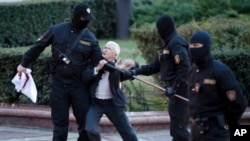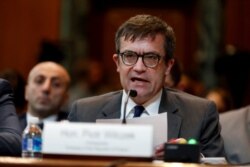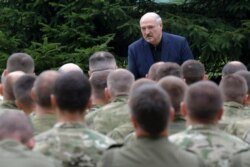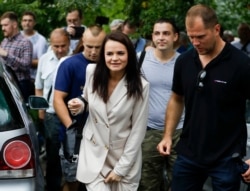Poland's top diplomat in Washington is calling for Russia to avoid any unilateral action to end a wave of protests against Belarusian President Alexander Lukashenko, saying the crisis can best be dealt with by a united effort of the international community.
"We can be sure that Russia is considering various scenarios in Belarus," Ambassador Piotr Wilczek told Voice of America when asked under what circumstances he thought Moscow might use military force in support of its sometime ally, Lukashenko.
"We hope that Moscow joins the international community's efforts to peacefully resolve this crisis, including the OSCE [Organization for Security and Cooperation in Europe] process, and will not consider unilateral actions.
"Nevertheless, the West and Russia's long-term goals towards Belarus differ."
Tens of thousands of Belarusians have turned out for daily protests since Lukashenko was returned to power in what many believe was a crudely rigged election on August 9. In many cases, protesters have been confronted by police using tear gas, flash grenades and beatings. An estimated 200,000 people marched in the capital, Minsk, on each of the last two Sundays.
Lukashenko has been quoted saying he has received a promise of security assistance if it is needed from Russian President Vladimir Putin, who has long aspired to reintegrate the two countries. Both were once part of the Soviet Union.
However, the Associated Press quoted Putin's spokesman, Dmitry Peskov, saying Russian leaders "have no intention" to meddle in a neighbor's internal affairs, "at least not during the current 'hot' stage" of the crisis.
While the West is striving for a more democratic Belarus, Wilczek said in written replies to questions from VOA that Russia's priority remains the provision of guarantees for further integration of the two countries, as well as respect for its own long-term interests.
One of those interests, according to analyst George Friedman, is to maintain Belarus as a buffer against the West.
Russia cannot afford to lose Belarus "after losing the Baltics and Ukraine," said Friedman, the founder and chairman of Geopolitical Futures, a company dedicated to forecasting the course of the international system. He noted that the eastern border of Belarus cuts deep into Russia.
On the other hand, Friedman said in a telephone interview, if the Russians were to take up positions on Belarus' western border facing Poland, it would create an intolerable situation for Warsaw and its European and American allies.
Friedman said Moscow and Washington both have been uninterested in a face-off over Belarus, so far enabling Lukashenko to perpetuate Belarus' "somewhat neutral" buffer state status. If Lukashenko were forced from power, he said, it could create a power vacuum with no clear leadership among the opposition.
Ian Brzezinski, a former deputy assistant secretary of defense for Europe and NATO policy in the U.S. government, disagreed, arguing that "the time for buffer states is long gone."
Brzezinski currently is a senior fellow at the Atlantic Council. He thinks the momentum for change is there and there is no reason why Belarus cannot succeed in transitioning to democracy as other Eastern European and Baltic states have done.
He also pointed to Sviatlana Tsikhanouskaya, who fled the country after her electoral challenge to Lukashenko fell short, as a potential alternative leader.
Brzezinski said he believes there are fewer risks for Putin in letting Belarus "go its way" than in an aggressive intervention that could not only anger and alienate the Belarusian public but also prompt new domestic challenges to his own leadership in Russia.
Kurt Volker, a former U.S. ambassador to NATO and special representative on Ukraine negotiations, agrees with Friedman that neither the Kremlin nor the West is in a mood for war. He said he thinks Putin will avoid deploying troops if he can, but that doesn't mean he will not intervene through other means, "including directing Belarusian security services."
"Unless Lukashenko holds on, or Putin can somehow stage-manage a transition to another authoritarian regime, I imagine he will get very nervous about the course of events in Belarus," said Hal Brands, a global affairs professor at the Johns Hopkins School of Advanced International Studies (SAIS).
Wilczek, the Polish ambassador, conceded that those opposing Lukashenko "still do not have any clear-cut or politically experienced leaders who could formulate a clear plan of action."
"But," he said, "what is abundantly apparent after seeing those peaceful protests is that the Belarusian people wish to determine the course of their own country, that they long for a sovereign and independent Belarus."
In an interview with Fox News this week, Tsikhanouskaya summed up the changing tide in her home country. "We're not the opposition anymore, we are the majority," she said.







